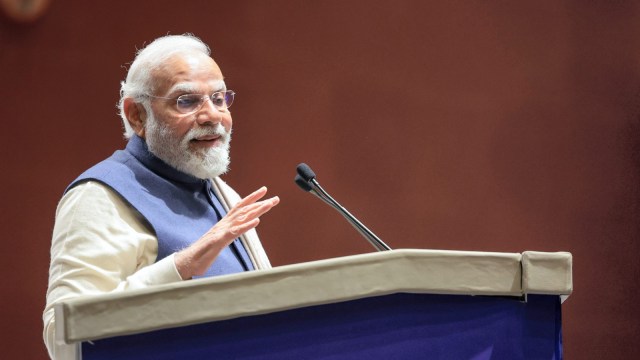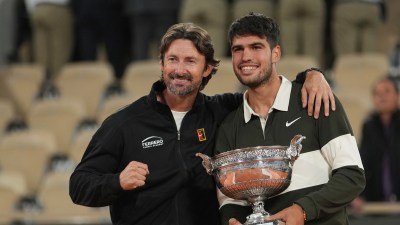ADDRESSING BENEFICIARIES of government welfare schemes over teleconferencing Monday, Prime Minister Narendra Modi said the purpose of the Viksit Bharat Yatra was to ensure that no eligible person is deprived of the benefits of such schemes.
He said it was his resolve to make India a developed country by 2047.

Timed right before the 2024 Lok Sabha elections, the yatra that has reached 11 crore people in 50 days, is touring villages across the country to spread awareness about the government’s welfare schemes so that more people can apply for the benefits.
PM Modi said, “Sometimes people are not aware of the schemes. Our government sees reaching out to villages across India as our responsibility. About 12 lakh new applications for Ujjawala have been received since this yatra started; 2 crore health check-ups have been done during this yatra. About 1 crore TB check-ups and 22 lakh sickle cell anemia check-ups have been done.”
He added, “These are rural, Dalit, backward, and Adivasi people. Earlier, they found reaching doctors difficult, now doctors are reaching them for check-ups. Up to Rs 5 lakh insurance, free kidney dialysis, and cheap medicines are now available for them. The yatra has proved a boon for the poor.”
Modi said, “People who spent their lives awaiting government assistance are now reaping the benefits. Who had thought officials and political leaders would reach their doors and ask whether they got benefits from government schemes or not? People are satisfied with this.”
Stating that “Modi’s guarantee” was now being discussed across India and the world, he added, “On a mission mode, the government is reaching out to each labharthi (eligible beneficiary). Why are we working so hard? In our country, many generations have lived with unfulfilled dreams. They thought lack of development was their destiny. Our government wants the present and future generations to be free from the difficulties their parents and grandparents faced. That is why we are working so hard.”
He said, “We are focusing on the future of our four castes – the poor, women, farmers, and youth. If they are strengthened, the country will be strengthened. That is the purpose of this yatra. The biggest goal of the yatra is that no eligible person should be left out of the benefits of government schemes.”
Story continues below this ad
He added that crores of women who had skill-sets such as tailoring and weaving, but no opportunities were now benefiting from schemes such as the Mudra Yojana.
“Ten crore sisters have joined women’s self-help groups in the last decade. Many have become lakhpati didis. It is my dream that the country should have 2 crore lakhpati didis. This is my resolve,” he said.
Referring to farmers, the PM said that 1 lakh drones were displayed during the yatra. “In the agriculture sector, drone training is being given. We will expand it to other sectors. Our government has made all efforts to make farmers’ lives better. Each farmer has got at least Rs 30,000 under PM Kisan Samman Nidhi. We have decided that pulse farmers will be able to sell their produce to the government online at MSP. It is for tur and arhar right now but (it) will be extended to other pulses too,” he added.
Interactive Session
Before the address, PM Modi virtually interacted with beneficiaries from various parts of India.
Story continues below this ad
From a tribal woman in Kanker of Bastar region in Chhattisgarh, a Muslim man who is part of a cooperative in Andhra Pradesh, an organic farmer from Aizawl in Mizoram, a sculptor from the OBC Prajapati community in Gorakhpur to a Sikh farmer from Gurdaspur in Punjab, the chosen beneficiaries for the interaction were taken from a mix of regions and social groups.
The PM interacted with Bhumika Bhuware, the tribal woman from Kanker, who makes mahua laddus that are sold to Sanjeevani mart at Rs 700 a kg. The PM jokingly said she was putting mahua (nectar-filled flowers) to good use, as it was otherwise used for intoxication by many.
Bhuware said she has benefited from many government schemes such as Ujjawala Yojana, which provides cooking gas; Jan Dhan, which provides bank accounts, and 5kg free ration.
“On January 15, I will meet most backward tribes to talk about Jan Mann Yojana,” PM Modi said, adding that it was his desire to improve the lives of the most deprived Adivasis.
Story continues below this ad
He then interacted with Syed Mohiuddin, who is part of an agricultural cooperative that has been running for 102 years in Nandyal, Andhra Pradesh.
“We got more than Rs 3 crore from NABARD under the agri-infra funds of your government for our organisation. We have built three godowns and will build two more. Farmers can store their grains with us,” he said.
Addressing him as “Mohiuddin Garu”, Modi said he saluted the farmers from the region for running a cooperative for more than 100 years.
The PM then advised him to spread information among farmers to use nano-fertilisers rather than chemical ones for better soil health.
Story continues below this ad
“But in our country some people add two extra spoons of sugar to sweetened tea. Don’t do that. Don’t use both kinds of fertilisers simultaneously. That will be very damaging for the soil,” the PM said.
Modi also interacted with an organic farmer from Aizawl and told him that the market for non-chemical farming has grown more than seven times in the last nine years.
He interacted with Lakshmichand Prajapati, a Gorakhpur-based sculptor who is part of a society that makes handmade terracotta sculpture that is sold in multiple cities.
Prajapati said while there was no awareness of the past government schemes, officials and newspapers inform people in his region of the government schemes under the BJP government.
Story continues below this ad
Gurvinder Singh Bajwa, a farmer from Gurdaspur in Punjab, also interacted with the PM and said that with new technology and machinery provided to farmers during his tenure, stubble burning in the district has gone down by 55 per cent.









